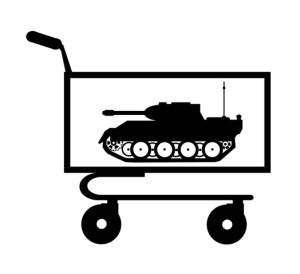Considered by many a historic achievement, the Arms Trade Treaty (ATT) establishing common standards for import, export and transfer of conventional arms, will, once in force, close a major loophole in international law. Unlike weapons of mass destruction or land mines, the rising trade in conventional arms had not previously been covered by any binding international rules.
The long-awaited treaty

Following years of difficult talks within the United Nations (UN), the ATT was adopted on 2 April 2013. In the absence of consensus, it was passed by a UN General Assembly resolution, with 154 votes in favour, 3 against (Iran, North Korea and Syria), and 23 abstentions. The ATT introduces specific and legally binding measures to regulate international trade (including transit and brokering) of conventional arms, in particular small arms and light weapons (SALW). Before giving authorisation (except in the case of gifts and loans), each state-party will have to evaluate each transaction against established criteria, through its national control system. The treaty prohibits transfers of arms in cases where a UN arms embargo is in place, or when there is violation of international agreements relating to illicit trafficking, or when there are known risks of genocide, crimes against humanity or war crimes. Where such prohibitions do not apply, an assessment must still be made of whether the transaction risks undermining peace and security, and of the potential for the arms to be used in violation of human rights, in terrorist attacks or by organised crime. All signatory countries must submit an annual report to the UN on international exports and imports of conventional arms, as well on national laws and administrative procedures adopted for the implementation of the ATT.
Prospects for implementation
As of 29 January 2014, the treaty had been signed by some 116 countries (including all EU Member States) and ratified by nine. The ATT will enter into force following the 50th ratification. The global ambition of the treaty could be threatened by the high number of abstentions on the resolution, including some major arms traders such as Russia, China and India, and by uncertainty over US ratification, which is opposed by large factions in both houses of Congress. Observers also note that the lack of a common enforcement mechanism leaves ATT application exclusively in the hands of states, a factor that may reduce the real impact of the treaty. Indeed, some governments, especially in developing countries, may lack the capacity to implement it, while others may interpret vague common criteria too sensitively to favour domestic defence-industry interests. The EU will support third countries that request assistance, in order to promote early entry in force and full implementation of the ATT.
European Parliament position
In a resolution of 13 June 2012 the European Parliament strongly backed the adoption of a comprehensive and global ATT. Particular emphasis was put on a broad set of criteria to assess arms transfers, including specific anti-corruption criteria, the impact of a country’s socio-economic development, and a record of good governance, which were not ultimately included in the ATT.
Since the ATT touches upon the common commercial policy, an exclusive EU competence, Foreign Ministers had to authorise MS to sign (Council Decision of 27 May 2013) and ratify the ATT (Council Decision of 17 July 2013). The EP is now expected to give its consent for MS to ratify, following the recommendation of the Committee on International Trade (rapporteur David Martin, S&D, UK). At the same time, MEPs will vote on a motion for a resolution, submitted by the Sub-Committee on Security and Defence, in association with the International Trade Committee, following a debate with the Commission.







